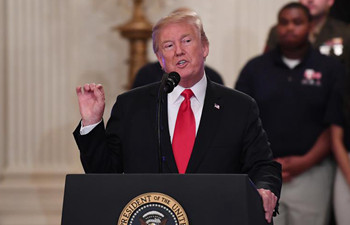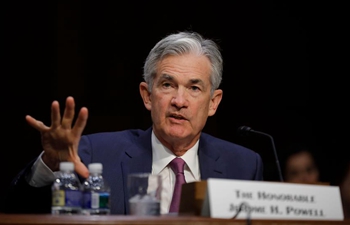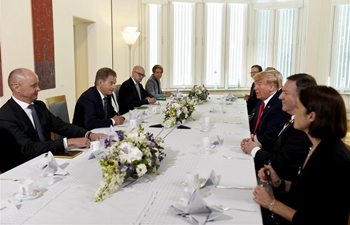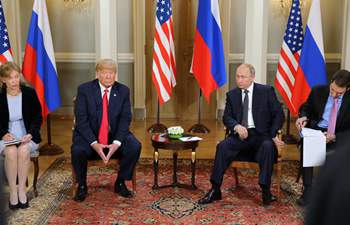BEIJING, July 20 (Xinhua) -- A new gas pipeline linking Russia and Germany has become a bone of contention between a number of European nations, the United States and Russia.
U.S. President Donald Trump opposes the construction of the Nord Stream 2 pipeline, and has criticized Germany's reliance on Russian natural gas, saying "Germany is totally controlled by Russia."
After meeting in Helsinki, Trump and Russian President Vladimir Putin said they would compete for the European gas market.
The multi-party wrangling triggered by the ongoing construction of the pipeline reflects the different commercial interests and geopolitics of the parties.
EUROPE: MANY ATTITUDES
Germany, due to its energy and commercial requirements, is the staunchest supporter of the Nord Stream 2 pipeline in Europe. It sees Europe as in need of Russia's gas and Russia as wanting to make money from Europe.
According to Eurostat, the European Commission agency providing statistical information, Germany imported 50 percent to 75 percent of its gas from Russia. As the pipeline directly links Russia and Germany via the Baltic seabed, after its construction, Germany will not only meet its own demand for gas, but will also become a European transit hub for Russian gas.
Nord Stream 2, together with the Nord Stream 1 pipeline, will be able to supply one-fourth of European Union (EU) members' natural gas demand. Nord Stream 1, built in 2011, has been overloaded in recent years.
However, Ukraine, Poland and the EU are opposing Nord Stream 2. Ukraine and Poland worry that Russia will reduce or even cease delivering gas via their own countries, which will affect their economies. The EU has said the pipeline will affect its strategy to diversify its sources of imported energy supply.
In order to maintain their strategic relations with the United States, some European countries have said they want to import U.S. gas. Poland, Lithuania and other Central and Eastern European countries have even said they would like to pay higher prices to import U.S. liquefied natural gas (LNG).
For European nations, how to diversify their energy supplies remains an arduous task. Though a highly prioritized strategy, it has still yielded little fruit.
U.S. CONSIDERATIONS
There are both economic and political concerns behind Trump's high-profile meddling in European gas supply.
Trump announced his "America First" energy plan right after taking office as part of a vigorous measure to develop local energy, especially shale gas. Besides securing energy independence, it will also expand U.S. influence in the global gas market.
The International Energy Agency estimates that the United States will become the second largest LNG exporter by 2022. Clearly, Europe, highly reliant on oil and gas imports and just across the ocean, will be targeted first.
However, Russia is the unquestionable leader of the European natural gas market. Nord Stream 2 will increase Russian natural gas exports to Europe. To counter Russia's growing energy edge, the United States has, as always, tied up this highly economic issue with defense and security to hinder EU-Russia energy cooperation.
Politically, the United States is afraid that Nord Stream 2 would further weaken the voice of European countries in the natural gas market. It regards natural gas as a geostrategic weapon to contain Russia's influence in Europe.
In August, Trump signed a new sanctions act against Russia, targeting Russian energy companies and projects. Europeans worry that the sanctions will hurt many European energy giants that are also Nord Stream 2 stakeholders, such as Royal Dutch Shell, and may even threaten the energy security of European countries.
Wolfgang Ischinger, chairman of Munich Security Conference, an annual international security program, says the purpose of the United States is to increase its own interests in Europe. But the issue of European natural gas supply should not be decided by the United States.
THE RUSSIAN ANGLE
For energy powerhouse Russia, exporting natural gas to Europe is also economically and geopolitically significant. Russia is the EU's largest natural gas supplier and its exports to the EU have continued to increase.
At present, Russia supplies gas to Europe through a number of pipelines. The pipeline that passes through Ukraine accounts for a large share. Due to the dispute with Ukraine, Russia has been hoping to reduce its dependence on transit countries.
So Nord Stream 2 has strategic importance for Russia. With the special bond of energy cooperation, Russia aims to improve relations with European countries, forge strategic cooperation.
However, it is still uncertain whether Russia's energy strategy for Europe can work out. First, Russia can't simply ignore the interests of Ukraine as a transit hub. Second, the EU and some European countries oppose any potential division and control of Europe by means of energy. The Russian-Ukraine crisis has prompted them to seek more sources of energy. Third, the United States will remain in the way of Russia's energy projects in Europe.
The Nord Stream 2 project is progressing steadily and is set to be completed next year. In the foreseeable future, the U.S.-EU-Russia wrangling over natural gas will continue.













